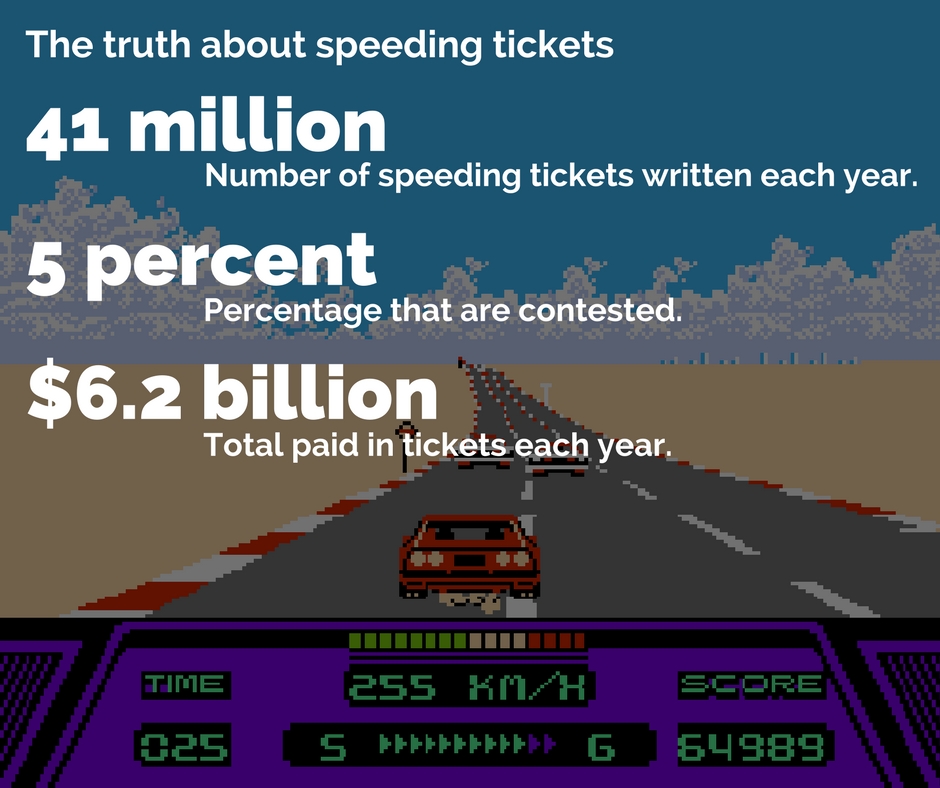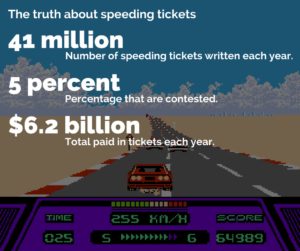
There are just under 200 million U.S. drivers and between 25 million and 50 million traffic citations are written each year. That’s according to the National Motorists Association back in 2007. Statistic Brain more recently estimated that 41 million people get speeding tickets each year. And only 5 percent of drivers contest them.
Long story short, speeding tickets are big business. That’s why we think all drivers can benefit from a quick refresher on the traffic citation that one in five of us are bound to get this year.

YOU CAN GO OVER THE LIMIT — JUST KEEP IT UNDER 10 MPH OVER, RIGHT?
No. The posted limit is the absolute limit. What makes it more complicated is the fact that police are also taught to use discretion. Drivers must drive at a safe speed given traffic and weather conditions. In other words, 55 mph may be too fast on the highway during a snowstorm. Failure to reduce speed is a very common citation. As for the 10 mph myth — it’s just that. Remember, the vehicle code is massive, giving police a wide variety of reasons to pull over motorists. Sometimes that even includes driving 60 mph in a 55 mph zone.
SPEEDING DOESN’T GET YOU WHERE YOU’RE GOING MUCH FASTER.
Lifehacker looked at this issue in 2014, and they found what researchers have been saying for years. Speeding doesn’t really work. If you’re driving 15 miles, you’re likely to save at most three to six minutes driving 10 mph over the limit. The real time savings only come when you drive 500 miles or more. Factor in the financial and safety risks — speeding tickets cost on average $150 and speeding kills nearly 10,000 people each year — and the extra minutes become insignificant.
DO YOU WANT TO PAY $100 A YEAR IN A SPEEDING TAX?
Insurance surcharges go up on average around $300 over three years. Speeding is an easy way to pad the profits of your insurance company.
BE HONEST AND THE OFFICER MIGHT LET YOU OFF WITH A WRITTEN WARNING.
We certainly don’t promote lying to police, but it would be foolish to ignore the facts. Remember that one-in-five statistic? That’s the number of drivers who will get a speeding ticket this year. Couple that with the fact that only 5 percent of those tickets ever get contested in court and you have a recipe for surefire revenue — for the local law enforcement agencies doing the ticketing. Anything you say after you’ve been pulled over can and most likely will be used against you in court.
But if you opt to waive your right to remain silent, take this advice from a veteran officer in the San Francisco Bay area. On PoliceOne.com, officer Jason Hoschouer offers his rubric for considering a written warning.
1. Attitude: Don’t have one. Always be polite.
2. Driving history: Have a clean one.
3. Honesty: In particular, don’t lie about things that can be easily proven. Your record, for example.
4. Responsibility: If you plan on being up front about the driving violation, then accept responsibility. Also plan on accepting the consequences. Warnings are never guaranteed.



